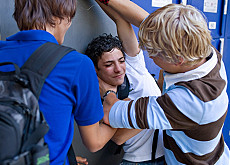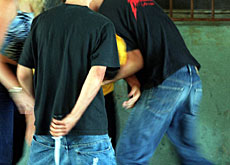Swiss want tougher measures on youth violence

Young people in Switzerland are more violent than 20 years ago and tough measures are needed to rectify the situation, according to the Swiss public.
Experts however are not so sure. A professor of education at Zurich University believes such thinking is “misguided” and that “it is a mistake to think that discipline creates quality”.
A survey published in three Swiss newspapers on Sunday revealed that 71 per cent of respondents believed young people in Switzerland were more aggressive today than 20 years ago and 73 per cent thought they were less disciplined.
The reason for this decline was clear, according to those asked: parents and society, which were blamed by 76 per cent and 69 per cent of people respectively.
When it came to solutions, two-thirds of the 1,100 people surveyed across Switzerland for SonntagsBlick, Le Matin Dimanche and Il Caffè believed a clip around the ear or a smack on the behind was acceptable.
Regarding wider measures, 55.7 per cent thought it was better for mothers to stay at home after having a child, 80.3 per cent thought parents of aggressive children should attend parenting courses and 55.9 per cent thought foreign youths who are convicted of a crime should be expelled from the country – along with their parents.
Less popular was a proposal by some politicians form the rightwing Swiss People’s Party that 14-year-olds convicted of a crime should be sent to prison. This received support from 40.3 per cent of respondents.
“Misguided”
But Jürgen Oelker, a professor of education at Zurich University, thinks calls for tougher measures against youth violence are “misguided” and that more discipline in school and at home does not help regarding youth violence.
Oelker admitted in an interview with the NZZ am Sonntag newspaper that youth violence had slightly increased, but he questioned whether the absolute number of incidents was up or only whether more were being reported.
“The perceived threat is certainly increasing,” he said. “But one must differentiate between what the statistics say and how people interpret them.”
Oelker rejected demands for greater strictness. “For centuries children were made to wear a dunce’s cap and stand in the corner. There were really tough disciplinary techniques that hindered learning.”
He said a transformation had taken place in school culture over the past 30 years which had led to more understanding for the pupil, to transparent rules and considered punishments.
“Whoever looks at how discipline used to be meted out would baulk at the thought of reintroducing such methods,” he said, putting the frequent demands for more strictness down to a “yearning for measures”.
Election issue
The issue of youth violence has been in the news and the mouths of politicians – mindful of the federal elections in October – since details of three alleged sexual assaults by youths on schoolchildren were revealed last year.
Recent crime figures also suggest that youth crime, particularly violent offences, is on the increase in Switzerland.
Much of the blame has fallen on foreign youths. In February Justice Minister Christoph Blocher, a leading light of the People’s Party, said: “Parents should also be called to account: from damages being paid, right up to the expulsion of the whole family for foreign children.”
Figures and experience showed that a high percentage of the perpetrators had a “migration background”, Blocher said, with many coming from the Balkans.
These were mainly young people with identity problems, which led to feelings of insecurity, which were compensated through violence, he said, adding that these problems had to be talked about without it being called racist.
swissinfo with agencies
The reputation of Swiss youngsters took a battering last year with several high profile allegations of rape involving youths.
A survey published in January showed that most Swiss were in favour of cracking down on youth violence.
However, it has not all been negative press. Zurich University research published last year found that young Swiss between the ages of six and 21 displayed emotional maturity and responsibility, despite a public perception of laziness and bad behaviour.
It was the first psychological and social survey of child and youth behaviour in Switzerland.
14,106 youths (11,189 boys and 2,917 girls) were convicted of crimes in 2005, according to the Federal Statistics Office. The figure is up about 2,000 on 1999.
62.7% of the convicted youths are of Swiss nationality.
The number of convictions for driving offences, attacks against people and property-related crimes has been on the increase since 1999, but there were fewer drug-related offences.
Three cases of alleged rape and sexual abuse committed by youths on schoolchildren in Zurich, canton St Gallen and Bern led to an outcry in Switzerland last year.

In compliance with the JTI standards
More: SWI swissinfo.ch certified by the Journalism Trust Initiative












You can find an overview of ongoing debates with our journalists here . Please join us!
If you want to start a conversation about a topic raised in this article or want to report factual errors, email us at english@swissinfo.ch.